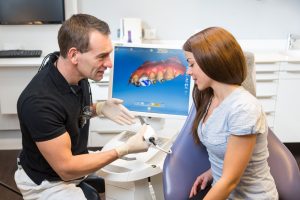Please note we may not offer these treatments at our office. Contact (970) 669-3918 to learn more.
An Innovative Solution to Infected Root Canals
Regenerative endodontics is a cutting-edge approach to treating damaged or infected teeth and an alternative treatment for root canal therapy. Regenerative endodontic therapy involves various clinical protocols and methodologies to treat necrotic immature teeth, utilizing the body’s natural healing mechanisms to regenerate new tissue and restore the function of the affected tooth. While traditional endodontic treatments focus on removing damaged tissue, regenerative endodontics aims to restore the tooth to its natural state.
Learn more about this treatment with our experienced Loveland, CO dentist’s guide, or by calling (970) 669-3918.
What Is Regenerative Endodontics with Stem Cells?
Regenerative endodontics (RET) removes damaged or infected pulp tissue and places bioactive material into the root canal. This material contains growth factors and stem cells that promote the regeneration of new tissue, including the pulp and dentin, which make up the core of the tooth. Dental pulp regeneration plays a crucial role in regenerative endodontics by utilizing advanced biotechnology techniques. Over time, this new tissue can restore the tooth’s natural function and structure.
The primary goal of RET is to achieve root maturation and apical closure, allowing the tooth to continue its normal development. Mesenchymal stem cells are essential in this process as they can differentiate into specific cell types like odontoblasts, which are vital for regenerating damaged dental structures. This treatment approach is particularly beneficial for young patients whose teeth are still developing.
The significance of the pulp dentin complex in regenerative endodontics cannot be overstated, as it is critical for restoring dental function and structure following damage. Traditional endodontic treatments such as root canal therapy (RCT) may result in thin and fragile roots, which can increase the risk of tooth fracture over time. RET, on the other hand, aims to stimulate root development, leading to stronger and more resilient teeth.
Benefits of Regenerative Endodontics
Regenerative endodontics offers several benefits over traditional endodontic treatments, including:
- Improved Success Rates: Studies have shown that regenerative endodontic procedures have higher success rates than traditional endodontic treatments, especially in cases of immature teeth with open apices (the tip of the root). Regenerating functional pulp tissues is crucial for achieving these higher success rates, as it helps restore the natural tooth functions.
- Reduced Risk of Future Infections: Regenerative endodontic procedures help create a biologically active root canal system that can resist infections and promote long-term tooth health.
- Reduced Need for Dental Implants: Regenerative endodontics can help avoid dental implants or other restorative procedures, which can be more invasive and costly.
- Cost-Effective: While regenerative endodontic procedures can be more expensive than traditional treatments, they can be a cost-effective option in the long term by reducing the need for additional treatments or restorations.
- Natural and Biocompatible: Regenerative endodontic procedures use natural materials and techniques that are biocompatible to the patient’s body, reducing the risk of adverse reactions or complications.
Candidacy for Regenerative Endodontics
Unfortunately, not all patients are candidates for regenerative endodontic procedures. The following factors are considered when determining if a patient is a good candidate for regenerative endodontics:
- Age: Regenerative endodontic procedures are most effective in patients under 18 when root development is still in progress.
- Tooth Maturity: Teeth with immature roots and open apices are good candidates for regenerative endodontic procedures, as these procedures can promote new tissue growth and help the root develop.
- Pulp Vitality: Regenerative endodontic procedures are most effective in teeth with vital pulp tissue, as this tissue provides the necessary growth factors and stem cells for tissue regeneration.
- Infection Status: Teeth with active infections may not be good candidates for regenerative endodontics, as the infection can interfere with regeneration.
- Tooth Structure: Regenerative endodontic procedures are most effective in teeth with intact coronal structure, as this provides a protective barrier for the newly regenerated tissue.
- Overall Health: Patients with certain medical conditions or compromised immune systems may not be good candidates for regenerative endodontic procedures, as these procedures require a healthy immune response for successful regeneration.
The Regenerative Endodontics Process
Examination and Diagnosis
A dental professional will examine the infected tooth to determine the extent of the damage and whether regenerative endodontic treatment is an appropriate option.
 Access and Cleaning
Access and Cleaning
Your Location dentist will make an opening in the tooth to access the pulp chamber and root canal space. They’ll remove damaged or infected pulp tissue and thoroughly clean the root canal space.
Placement of Regenerative Material
They’ll introduce a regenerative material into the root canal space, which may include blood products, stem cells, growth factors, or other materials that stimulate new tissue growth.
Temporary Filling
Your dentist will place a temporary filling in the tooth to protect it while the new tissue develops.
Follow-up Appointments
You’ll need to return for several follow-up appointments to monitor the progress of the treatment and assess whether the new tissue is developing as it should.
Follow-up appointments are crucial in assessing the progress of regenerative endodontic therapy, ensuring that the biological principles behind regeneration are effectively supporting the development of new tissue.
Regenerative Endodontics for Immature Teeth
Regenerative endodontics for immature teeth is a groundbreaking approach that aims to promote root development and tissue regeneration in teeth that are still forming. Immature teeth, often referred to as non-vital or necrotic teeth, present unique challenges when treated with traditional endodontic methods. However, regenerative endodontic procedures offer new hope for these teeth.
The primary goal of regenerative endodontics for immature teeth is to stimulate root development and tissue regeneration, allowing the tooth to continue its natural growth. This is achieved through the use of stem cells, growth factors, and tissue engineering techniques. During the procedure, the root canal system is meticulously cleaned and disinfected, and a scaffold is placed to support the growth of new tissue.
Studies have shown that regenerative endodontic procedures for immature teeth can lead to significant root development and tissue regeneration. This innovative approach has the potential to revolutionize the treatment of immature teeth, providing a more biologically based and less invasive alternative to traditional endodontic methods. By harnessing the body’s natural healing mechanisms, regenerative endodontics can help preserve the function and structure of immature teeth, offering a promising solution for young patients.
Choosing a Regenerative Endodontic Specialist in Loveland, CO
Selecting the right regenerative endodontic specialist in Loveland, CO, is crucial to ensure you receive the best possible care. Here are some tips to help you make an informed decision:
- Look for a specialist with experience in regenerative endodontics: Since regenerative endodontics is a relatively new field, not all endodontists have experience with these procedures. Seek out a specialist who has completed advanced training in regenerative endodontics and has a proven track record of successful cases.
- Check their credentials: Ensure the specialist is a licensed endodontist in good standing within the dental community. Verify their credentials with reputable organizations such as the American Association of Endodontists (AAE) or the American Dental Association (ADA).
- Read online reviews: Online reviews from previous patients can provide valuable insights into the specialist’s reputation and level of care. Pay particular attention to reviews that mention regenerative endodontic procedures specifically.
- Ask about their approach: Regenerative endodontics is a complex field, and different specialists may have varying approaches. Inquire about their specific methods, including the types of stem cells and growth factors they use, and their experience with tissue engineering techniques.
- Check their facilities and equipment: Ensure the specialist has access to state-of-the-art facilities and equipment, such as microscopes and 3D imaging technology, which are essential for successful regenerative endodontic procedures.
- Ask about their communication style: Effective communication is key to a successful treatment outcome. Discuss the specialist’s communication style and how they will keep you informed throughout the treatment process.
By following these tips, you can find a qualified regenerative endodontic specialist in Loveland, CO, who can help you achieve the best possible outcome for your teeth.
Frequently Asked Questions
While regenerative endodontics shows promise for treating immature permanent teeth with infected pulp, there are several limitations associated with this approach. Here are some common limitations:
- Patient age
- Pulp tissue condition: Regenerating pulp tissues in certain conditions can be challenging due to the need for stem cells that can differentiate into odontoblasts and form a functional pulp-dentin complex.
- Root canal anatomy
- Limited long-term data
- Time-consuming process
- Treatment complexity and expertise
- Limited application
Regenerative endodontic treatment typically requires multiple appointments over several months to complete. The exact length of treatment will depend on factors such as the severity of the damage, the patient’s age, and the healing rate of the tooth.
Insurance coverage for regenerative endodontic treatment can vary depending on the patient’s policy and the treatment performed. Patients should check with their insurance provider to determine whether regenerative endodontic treatment is covered and to what extent. In some cases, insurance may only cover the cost of traditional root canal therapy, not regenerative endodontics.
Discover This New and Modern Dentistry Technique
Regenerative endodontics is a promising new approach to treating damaged or infected teeth. By using the body’s natural healing mechanisms, regenerative endodontics can promote the growth of new tissue and restore the function of the affected tooth. As research continues, regenerative endodontics will likely become an increasingly popular option for dental patients seeking to preserve their natural teeth.
To learn more, call our Loveland, CO, office at (970) 669-3918 to schedule a consultation. We proudly serve Colorado patients in Loveland and surrounding areas such as Greeley, Evans, and Garden City.
